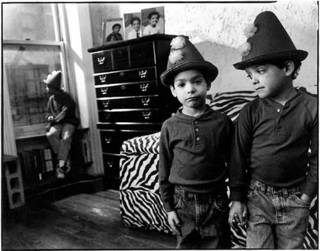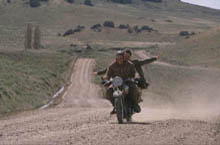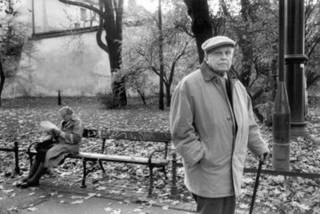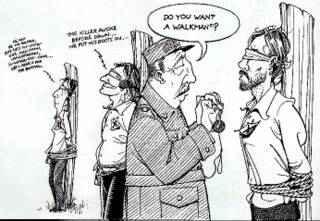
Mary Ellen Mark: Adopted Children, New York City, 1993
Went to see the exhibition of Mary Ellen Mark photography, American Odyssey and Twins at Manchester Art Gallery. American Odyssey consists of black and white images of American subjects, taken over four decades since the 1960s. Subjects range from homelessness (including a memorable image of a family living in a car, and the one above taken in a refuge for the homeless) to challenging images taken at a gatherings of Aryan Supremecists, anti-abortion actions, pro-Vietnam War rallies and a convention to celebrate fatness in America . All her photos are challenging because of the way they present the their subjects: squarely, and without the usual framing commentary, as unique human beings. The images have empathy, humanity and a penetrating vision. With American Odyssey, the Gallery was showing another series of Mark’s photographs, Twins.
Reproduced alongside the images, and providing a commentary on them, was Maya Angelou's poem Human Family:
I note the obvious differences
in the human family.
Some of us are serious,
some thrive on comedy.
Some declare their lives are lived
as true profundity,
and others claim they really live
the real reality.
The variety of our skin tones
can confuse, bemuse, delight,
brown and pink and beige and purple,
tan and blue and white.
I've sailed upon the seven seas
and stopped in every land,
I've seen the wonders of the world
not yet one common man.
I know ten thousand women
called Jane and Mary Jane,
but I've not seen any two
who really were the same.
Mirror twins are different
although their features jibe,
and lovers think quite different thoughts
while lying side by side.
We love and lose in China,
we weep on England's moors,
and laugh and moan in Guinea,
and thrive on Spanish shores.
We seek success in Finland,
are born and die in Maine.
In minor ways we differ,
in major we're the same.
I note the obvious differences
between each sort and type,
but we are more alike, my friends,
than we are unalike.
We are more alike, my friends,
than we are unalike.
We are more alike, my friends,
than we are unalike.
- Guardian review of Manchester exhibition
- Mary Ellen Mark: American Beauty Photo essay at Time magazine
- Mary Ellen Mark Photographs
- Multimedia interview





